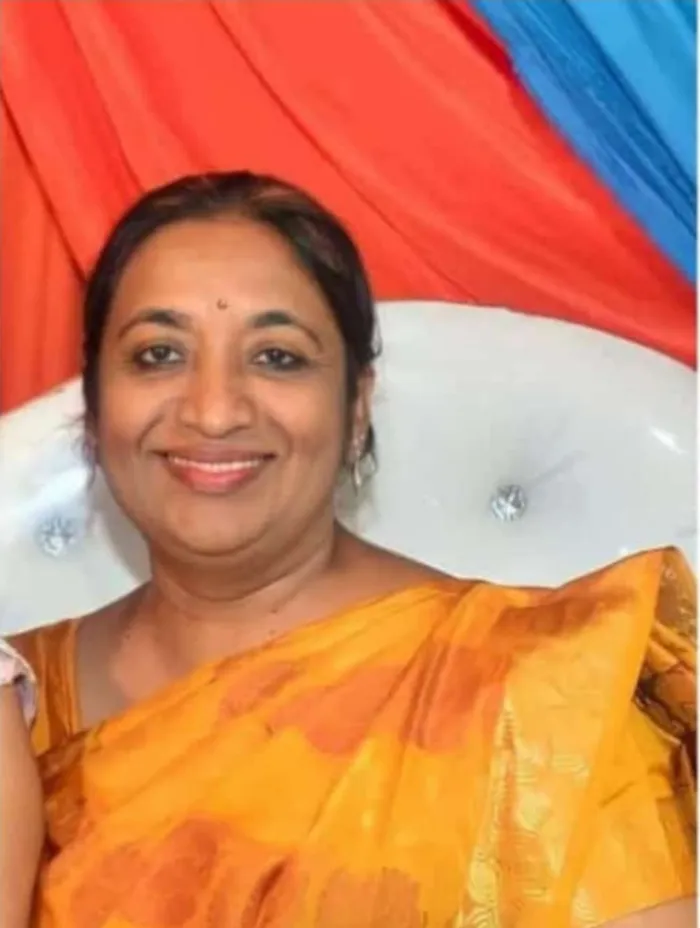
Chief director for financial accounting at Gauteng Department of Health, Babita Deokaran, was brutally murdered after she raised alarm on large-scale corruption at Tembisa Hospital.
Image: File
Parliamentarians stated that Babita Deokaran, who exposed corruption at the Gauteng Department of Health, and other whistle-blowers would still be alive if they were protected by the government.
These were the sentiments echoed on Friday during a discussion over the strengthening of whistle-blower protection by enacting robust laws that guarantee anonymity, job security, and legal support for individuals who report corruption.
Deokaran was the acting chief financial officer at the department and reported on financial fraud and corruption at Tembisa Hospital when she was killed outside her home in August 2021.
The Whistle-blower Protection Bill is due to be introduced to Parliament later this year. The Bill follows a recommendation by the State Capture Commission, contained in its report released in 2022, that whistle-blower legislation be amended to provide increased protection.
Visvin Reddy, an MP in the uMkhonto weSizwe Party (MKP), stated that the MKP does not run away from corruption, but face it head on.
"We don't silence whistle-blowers, we protect them because in a country drowning in lies, the person who tells the truth is the bravest one of all. If Babita Deokaran had spoken out under an MKP government, she would still be alive, protected and not hunted, celebrated and not assassinated.
"There are officials in departments who are watching bribes being paid daily, and municipal officials who see tenders being given to cronies while people go without water. They stay silent because they know the risk," Reddy stated.
Philip van Staden, Freedom Front Plus MP, said other examples include: Pamela Mabini (murdered), Athol Williams (fled the country), Jimmy Mohlala (murdered), Martha Ngoye (dismissed by the Passenger Rail Agency of South Africa), and Cynthia Stimpel (dismissed).
"These examples clearly demonstrate a significant lack of legal, financial, and psychological support for those who expose corruption in government and elsewhere. The Department of Justice and Constitutional Development's draft document outlining proposed reforms for whistle-blower protection, published in June 2023, has still not been finalised, despite President Cyril Ramaphosa’s undertaking to do so in his State of the Nation Address at the beginning of the year," he said.
Van Staden believed that South Africa does not have the experience, expertise, intelligence capabilities, and manpower needed to enforce laws.
"The significant shortcomings in, among other things, crime intelligence are evident in ordinary criminal cases, which often end in unsuccessful prosecutions," he added.
Advocate Glynnis Breytenbach, an MP and member of the DA, said the National Prosecuting Authority (NPA) has failed to secure a single successful prosecution of a politically connected figure implicated in state capture.
Breytenbach said that cases like the Vrede Dairy scandal, the Zizi Kodwa debacle, and the Transnet corruption trial have all collapsed due to incompetence, poor preparation, or basic procedural errors.
Corruption has reached epidemic proportions, said EFF MP Thapelo Mogale, adding that President Cyril Ramaphosa himself was involved in the Phala Phala saga where the theft of $4m from his game farm became international news.
The stigma of being labelled an impimpi, which refers to a police informer or spy in South Africa, should also be addressed and dismantled in communities, said Thokozani Langa, an IFP MP.
Langa added that whistle-blowers should be heroes and not seen as traitors.
Marlon Daniels, a Patriotic Alliance MP, said that robust laws should guarantee legal defence for whistle-blowers who face frivolous lawsuits after reporting corruption.
Daniels also warned about false allegations and those who want to settle personal scores.
Meanwhile, Corruption Watch (CW) attorney Nkululeko Conco said that in August 2023, CW made submissions on the discussion paper titled Proposed Reforms for Whistle-blower Protection Regime in South Africa.
Other CW recommendations are that:
- An agency will be established that is in line with proposals contained in the National Anti-Corruption Strategy, to advise and support whistle-blowers.
- There is a public education drive on whistle-blowing and its merits and dangers, to de-stigmatise the practice.
- The government allocated money from the Criminal Assets Recovery Fund to help support whistle-blowers who are seeking legal, security, and mental support.
- Sanctions are established for those who intimidate or threaten whistle-blowers.
zainul.dawood@inl.co.za
